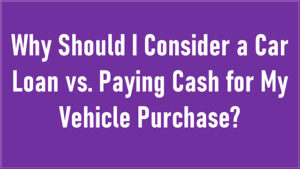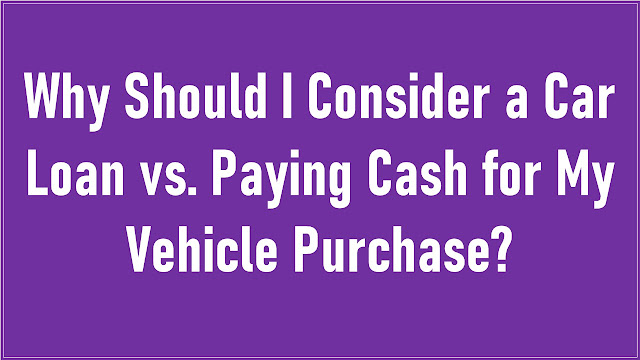
Introduction.
In this article, I’ll delve into a common dilemma that many prospective car buyers face: Should you consider taking out a car loan, or is paying cash for your vehicle purchase the smarter choice? This decision can significantly impact your financial well-being and your overall satisfaction with your new vehicle.
The allure of paying cash for a car is undeniable. It means no monthly payments, no interest, and complete ownership from day one. However, before you empty your bank account, it’s crucial to explore the advantages of car loans, such as maintaining your liquidity, potentially building credit, and seizing the opportunity to invest your money elsewhere. We’ll weigh the pros and cons, helping you make an informed decision that aligns with your financial goals and lifestyle.
- Financial Flexibility: Car loan offers more budget flexibility.
- Preserve Cash Flow: Keep cash for emergencies and investments.
- Credit Building: Improve credit score through responsible payments.
- Affordable Monthly Payments: Ease the burden on your wallet.
- Leverage Low-Interest Rates: Capitalize on low loan rates.
- Tax Deductions: Potential deductions can reduce overall vehicle cost.
Financial Flexibility: Car loan offers more budget flexibility.
One significant advantage of opting for a car loan instead of paying cash upfront for your vehicle purchase is the enhanced financial flexibility it provides. When you pay for a car with cash, you deplete a substantial portion of your savings in one go, potentially leaving you with limited financial cushion for unexpected expenses, investments, or other important financial goals.
On the other hand, a car loan allows you to spread the cost of the vehicle over a period of time, typically several years. This means that you don’t have to part with a large lump sum of cash at once, preserving your financial flexibility. By making monthly payments, you can allocate your funds to other priorities, such as an emergency fund, retirement savings, or investments. It can be especially advantageous if you anticipate future financial needs, as you won’t have all your resources tied up in your car.
Preserve Cash Flow: Keep cash for emergencies and investments.
Preserving your cash flow is another compelling reason to consider a car loan over paying cash for your vehicle purchase. When you pay for a car upfront, you use a significant portion of your available cash, which could otherwise be used for various purposes, including handling emergencies and pursuing investment opportunities.
Emergencies can strike at any time, from medical bills to home repairs, and having readily accessible cash can provide a crucial safety net. With a car loan, you can keep a substantial portion of your cash untouched, ensuring you’re well-prepared for unexpected financial challenges.
Furthermore, preserving cash flow allows you to take advantage of investment opportunities that may arise. Investing your funds wisely can lead to potential financial growth and increased wealth over time. With a car loan, you can allocate your funds to investments that offer a higher return on investment than the interest you pay on the loan, potentially making your money work for you.
Credit Building: Improve credit score through responsible payments.
Choosing a car loan over paying with cash can be an effective strategy for building or improving your credit score. Your credit history and credit score play a crucial role in your financial life, influencing your ability to secure favorable interest rates on future loans and access various financial opportunities.
When you take out a car loan, you have the chance to demonstrate responsible financial behavior by making timely payments each month. These on-time payments contribute positively to your credit history, showcasing your reliability as a borrower. Over time, this can result in a higher credit score, making it easier for you to obtain favorable loan terms in the future, such as for a home mortgage or a business loan.
In contrast, paying for a car in cash doesn’t provide the same credit-building opportunity because it doesn’t involve a lending institution reporting your payment history to credit bureaus. This means you miss out on the chance to establish or enhance your credit profile through responsible financial management.
Affordable Monthly Payments: Ease the burden on your wallet.
Affordable monthly payments are a key benefit of choosing a car loan. When you purchase a car with cash, you incur a substantial one-time expense that can strain your budget, possibly causing financial stress. In contrast, a car loan allows you to break down the cost into manageable monthly payments, making it easier to fit into your regular budget.
This approach not only spreads the financial burden over time but also gives you more control over your monthly cash flow. By knowing the exact amount you need to set aside for the car payment each month, you can plan your budget more effectively. This predictability can help prevent financial surprises and allow you to allocate your funds to other essential expenses and goals.
Moreover, car loans often come with various repayment options, allowing you to select a term and monthly payment that aligns with your financial situation. You can choose a shorter loan term with higher monthly payments if you want to pay off the car quickly or opt for a longer term with lower monthly payments to free up more cash for other purposes.
Leverage Low-Interest Rates: Capitalize on low loan rates.
One compelling reason to consider a car loan is the opportunity to leverage low-interest rates when they are available. Many lending institutions offer competitive interest rates on auto loans, especially if you have a good credit history. By taking advantage of these low rates, you can save money on the overall cost of your vehicle.
When you pay for a car in cash, you miss the chance to benefit from these favorable loan rates. In contrast, with a car loan, you can capitalize on lower interest rates, which can result in substantial savings over the life of the loan. Lower interest rates mean that a smaller portion of each monthly payment goes toward interest, allowing you to pay off the principal balance faster.
Additionally, lower interest rates can make your monthly payments more affordable, reducing the financial burden of car ownership. This means you can allocate your funds to other financial goals or investments while still enjoying the benefits of your vehicle.
Tax Deductions: Potential deductions can reduce overall vehicle cost.
When considering a car loan, it’s essential to be aware of potential tax deductions that may be available to you. In some cases, the interest paid on your auto loan may be tax-deductible, depending on your tax situation and how you use the vehicle.
For instance, if you use your car for business purposes, you may be eligible to deduct a portion of the interest as a business expense. This can reduce your overall cost of owning and financing the vehicle, effectively lowering the total amount you spend on the car.
However, it’s important to consult with a tax professional or accountant to determine the specific deductions available to you based on your individual circumstances. Tax laws can be complex and subject to change, so professional advice can ensure you maximize your potential deductions.
Conclusion.
I hope this exploration of car loans versus paying cash has shed light on the crucial considerations when making a vehicle purchase. In conclusion, the decision ultimately depends on your individual financial circumstances and preferences.
Opting for a car loan allows you to preserve your liquid assets, maintain a healthy credit history, and potentially invest your cash elsewhere. On the other hand, paying in cash eliminates debt obligations, interest payments, and provides a sense of ownership from day one. Remember, each choice has its pros and cons, and what’s paramount is finding the right balance that aligns with your financial goals. Therefore, whether you’re inclined to finance or pay upfront, make a decision that suits your current situation and secures a brighter financial future.
